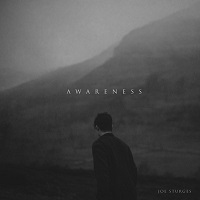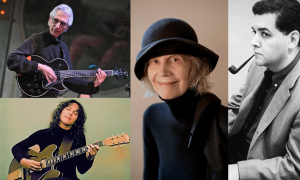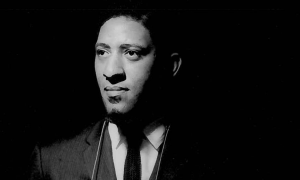Home » Jazz Articles » Highly Opinionated » Frank Sinatra: Myth, Reality and a Critic Standing in Li...
Frank Sinatra: Myth, Reality and a Critic Standing in Line at ArbyЎҜs

...anyway you slice it, 'scooby doo be do' is not scat. He carefully crafted his music. He didn't create it on the spot.
Frank Sinatra
vocals1915 - 1998
In order to get a whiff of the current zeitgeist, I asked a question on jazz social media—"Sinatra: jazz or pop singer"—and the response was immediate, vehement and disproportionately large. Phrases like "impeccable phrasing" "transcendent," "stamp his own indelible imprint on a song" appeared often in comments. Some took offense at the question being asked at all, with comments like: "He's one of the greatest singers of all time. He doesn't need approval from anyone." In one attempt to put him in the jazz category, someone went so far as to say: "'scooby dooby doo' is scatting." Some hardcore jazz people were reluctant to claim him as their own, but overall, ne'er was heard a discouraging word. Of course-as Perry Mason would say-it's irrelevant and immaterial whether one categorizes Sinatra as a pop or a jazz singer, but the subtext in most of the messages seemed to be: Old Blue Eyes' voice soothes the mind and stirs the heart, so don't spoil the mood with critical analysis.
Pushing ahead, nonetheless. On the jazz side of the ledger, Sinatra listened and borrowed from the best:

Louis Armstrong
trumpet and vocals1901 - 1971

Billie Holiday
vocals1915 - 1959

Tommy Dorsey
trombone1905 - 1956

Count Basie
piano1904 - 1984
The fact that Sinatra brought a singular sense of emotional vulnerability to male singing has been oft stated. Yes, but it's also true that Sinatra was a capable actor and demonstrated vulnerability onscreen that helped to reinforce that quality when coming off the grooves of his records. Again, there's truth, but deftly reinforced.
The most obvious quality at play in designating anything as jazz is improvisation and there's a lot of exaggeration surrounding the improvisatory capacities or inclinations of Sinatra. He took few real melodic risks. Of course he diverged from the way songs were written and never sang a song "straight," but no popular singer has sung a melody straight since Sophie Tucker sang "Some of These Days" in 1907. As far as recording goes, the reality is pretty far from the myth: that Sinatra would go in the studio and just rip it off right away-boom, one or two takes and that was it. When recording, he was not the off-the-cuff swinger who took it as it came, as take #8 of "I've Got a Crush on You" in this collection shows. In fact, as detailed in Charles L. Granata's book Sessions with Sinatra: Frank Sinatra and the Art of Recording (Chicago Review Press, 2003), Sinatra was a perfectionist, who would reject hours of recording that he thought were not "just right." He would experiment with the details in the studio, find what he liked and stick with it. As to whether this marks a jazz singer, the answer is ambiguous (cf. Billie Holiday), but anyway you slice it, "scooby doo be do" is not scat. He carefully crafted his music. He didn't create it on the spot.
As far as Sinatra's "ring-a-ding-dings," "broads," sly homophobic interjections, etc.—can definitely do without it, but it says more about him as a man than a musician and in this review I'm doing what I can to separate the two.
After Sinatra rose to fame in the late '30s-mid '40s, he hit a trough around 1950, as R&B and rock and roll began to take hold. He recorded a bunch of failed pop-jazz hybrids during that period (with Mitch Miller, whom he never forgave) but it was the series of recordings of ballads and "easy swingers" (he never had blues in heavy rotation) he made in the mid-1950's that revitalized his career.
In the middle of that resurgent period, he began releasing Lp's in two main categories: swingers with the likes of Count Basie and ballads, into which the 1960 album Nice "N Easy (Capitol, 1960) falls. The title states it clearly enough-perhaps understates it-as the title track "Nice "N Easy" has a little bounce to it and is friskier than any other song on the album. I won't go into detail on individual songs except to say that "You Go To My Head" is my favorite and "How Deep is the Ocean," my least favorite. The songs are all well crafted by professional songwriters and arranged by

Nelson Riddle
arranger1921 - 1985
Nice "N Easy was a 1960 recording, but there's great consistency in the way Sinatra approached a ballad, whether he was singing it in 1940, 1950, 1960 or 1970, and during the course of at least 4 decades, he managed to capture a large proportion of the American romantic musical imagination. How 2020 ears will hear this music I can't say. The music might sound alien, cornball or inferior to the ballad singing from that era of

Johnny Hartman
vocals1923 - 1983

Nat King Cole
piano and vocals1919 - 1965

Sarah Vaughan
vocals1924 - 1990

Jon Hendricks
vocals1921 - 2017
Photo: Google Images
Tags
Highly Opinionated
Steve Provizer
frank sinatra
Tommy Dorsey
Count Basie
Billie Holiday
Nelson Riddle
Jon Hendricks
Comments
PREVIOUS / NEXT
Support All About Jazz
 All About Jazz has been a pillar of jazz since 1995, championing it as an art form and, more importantly, supporting the musicians who make it. Our enduring commitment has made "AAJ" one of the most culturally important websites of its kind, read by hundreds of thousands of fans, musicians and industry figures every month.
All About Jazz has been a pillar of jazz since 1995, championing it as an art form and, more importantly, supporting the musicians who make it. Our enduring commitment has made "AAJ" one of the most culturally important websites of its kind, read by hundreds of thousands of fans, musicians and industry figures every month.








 Buy Now
Buy Now





















